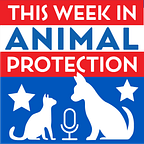
These are some of the stories making headlines in animal protection:
Subscribers can also listen to the podcast above, which includes extended commentary on many of the issues.
For those who want to skip the news and go straight to the main discussion, it begins at the 20:21 mark.
There is also a 15-minute sample of the podcast for those who have not yet subscribed. Sample podcasts are also available on Apple, Spotify, and Google Play.
As reported last week, PETA called on Killeen, TX, pound staff to continue killing animals rather than embrace readily-available, cost-effective alternatives to that killing.
This week, Manteca, CA, shelter staff is using PETA to defend killing in their facility after “Manteca Mayor Ben Cantu has come out strongly in favor of the city pursuing a no-kill shelter for the municipal facility.”
Despite PETA opposition, the Mayor is undeterred. “Cantu vowed to push for solutions that will work toward eliminating ‘the short time frame to death’ for a number of animals that are taken in at the city’s shelter.” The No Kill Advocacy Center has reached out to Mayor Cantu offering those solutions.
PETA’s position should surprise no one. This week was also the anniversary of PETA’s theft and killing of Maya. On October 18, 2014, two PETA representatives backed their van up to a home in Parksley, VA, and threw biscuits to Maya, who was sitting on her porch. They were hoping to coax her off her property and give PETA the ability to claim she was a stray dog “at large” whom they could legally impound.
Maya refused to stay off the property and, after grabbing the biscuit, ran back to the safety of her porch. One of the PETA representatives went onto the property and took Maya. Within hours, Maya was dead, illegally killed with a lethal dose of poison.
Maya’s family would ultimately sue PETA, alleging theft, trespass, and intentional infliction of emotional distress. PETA, in turn, asked the court to throw out the lawsuit based on several questionable claims, including their argument that Maya was legally worthless because she was just a dog. But after losing that and other similar claims, PETA paid Maya’s family $49,000.
A series of articles I wrote about Maya’s killing ultimately led to the publication of “Why PETA Kills,” my book. “Why PETA Kills” tells Maya’s story and tens of thousands of others who have died at their hands, which continues to increase by the thousands yearly. It would also lead PETA to sue me (spoiler: I won!).
Why PETA Kills is available on Amazon, but subscribers can also listen to a free audio version of the book.











